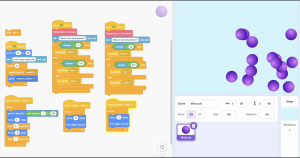71 Chapter 59: Scratch – Molecular Motion Simulation
By: Preetika Gandhi
Scratch – Molecular Motion Simulation
Description
Scratch is a block-based programming language that allows users to create interactive projects with ease. The Molecular Motion Simulation resource uses Scratch to model how water molecules behave in solids, liquids, and gases based on temperature inputs. Users input a temperature, and the program categorizes the state of matter while adjusting molecular movement accordingly. This tool is particularly useful in science education as it visually represents abstract concepts such as molecular motion, particle theory, and phase changes, making them more accessible to students. Additionally, integrating coding with science fosters computational thinking and interdisciplinary learning. One limitation is that Scratch has some graphical constraints, which may not capture the complexity of real molecular interactions. However, for middle and high school students, this provides an engaging and interactive way to explore scientific concepts.
How it might be used in the classroom
Teachers can use this Scratch simulation to introduce or reinforce the concept of molecular motion and states of matter. A lesson could start with a discussion on how molecules behave at different temperatures, followed by a demonstration of the Scratch project. Students can input various temperatures, observe the resulting molecular movements, and analyze patterns. Additionally, they can modify the project by changing variables such as molecule speed, direction, or even adding phase transition animations. This hands-on approach promotes inquiry-based learning and enhances student engagement. To get started, educators can share the Scratch project link with students, guide them in making predictions, and encourage them to test and modify the code. This activity aligns with computational thinking principles and supports both coding and science curricula.

Resource information
Tags: Science, Coding, Molecular Motion, Scratch, Simulation
URL link to code: https://scratch.mit.edu/projects/1143042989
Media Attributions
- Liquid State
